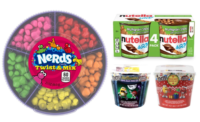The food and beverage industry is worried about the current economy, and nearly two-thirds of companies have seen a decline in new business development activity amid the COVID-19 pandemic. Meanwhile, 16 percent of companies have temporarily closed their business, and 25 percent expect to need to lay off employees over the next three months.
That’s according to a new survey, “Food & Beverage Manufacturing Industry Industry Perspective on the Challenges of Today, Week of 3/23/20.” The report was created by Clear Seas Research, which is owned by BNP Media, the parent company of Candy Industry.
The research is the first survey done in response to the coronavirus pandemic by BNP and is expected to be conducted on a regular basis to help offer the food and beverage sector the ability to gain big picture insights into how the coronavirus is impacting things.
“The coronavirus outbreak is a human tragedy with very real business and economic consequences. Business leaders globally are in uncharted waters as together we face the challenges surrounding the recent pandemic and resulting economic impact. Insight into how others are reacting, overcoming current challenges, and planning for tomorrow can provide us with not only comfort, but a shared community of learning and preparation,” the report stated.
The results offer an inside look at how the food and beverage industry as a whole is faring during the global coronavirus pandemic.
It found that 64 percent of respondents saw a decline in new business development activity, 12 percent saw no change and 23 percent saw an increase.
And, 54 percent saw a decline in business spending, while 32 percent saw no change, and 14 percent saw an increase.
In addition, the survey revealed 60 percent of active business is still on schedule, while 22 percent has been delayed, and 18 percent has been canceled.
The research showed that 56 percent of planned business is on schedule, while 27 percent has been delayed and 17 percent has been canceled.
It also showed the percent of companies that are concerned about various potential impacts, including:
- The current economy (78 percent)
- Achieving business goals over the next three months (75 percent)
- Achieving business goals over the next six months (73 percent)
- Business stability for the next 12 months (69 percent)
- Supply chain interruptions (66 percent)
- Friends and family becoming infected by COVID-19 (64 percent)
- Employees not showing up for work (52 percent)
- Becoming personally infected by COVID-19 (49 percent)
- Skilled labor shortages (43 percent)
- IT Cybersecurity with remote employees (22 percent)
It also looked at the next three months, and the percentage of companies that expect to:
- Lay off some employees (25 percent)
- No change (23 percent)
- Hire new employees (22 percent)
- Don't know (20 percent)
- Temporarily suspend employees without pay (18 percent)
- Temporarily suspend employees with pay (16 percent)
- Rehire previously suspended/laid off employees (15 percent)
- Lay off all employees (3 percent)
Food and beverage companies also are working hard to keep employees safe, including:
- Encouraging hand washing (91 percent)
- Promoting social distancing (86 percent)
- Increased frequency of cleaning/sanitizing procedures (85 percent)
- Providing hand sanitizer/antibacterial soaps (80 percent)
- Eliminating/reducing employees business related travel (69 percent)
- Giving employees the option to work from home (65 percent)
- Personal protection equipment being provided (43 percent)
- Delaying projects (42 percent)
- Requiring employees to work from home (38 percent)
- Cancelling projects (32 percent)
- Splitting workforce shifts to reduce number of employees onsite (28 percent)
- Temporary closing of business (16 percent)
- Purchasing new technology for remote works (15 percent)
- Increased time between shift changes (11 percent)
“The bringing together of industry professionals to share their experiences with the coronavirus / COVID-19 as related to business activities including planning, staffing, investing, and marketing in an online survey, provides a collective industry perspective,” the report says. “This is a perspective that will continue to change over time; a perspective that can help inform the business decisions we make today as well as our future plans. This is a perspective that can unite the industry and encourage collaboration; a perspective that will be monitored and reported as events continue to evolve.”





